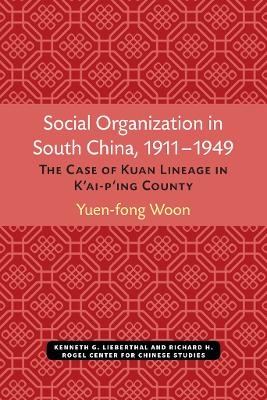
Social Organization in South China, 1911–1949
The Case of Kuan Lineage in K’ai-p’ing County
Seiten
1984
Centre for Chinese Studies Publications (Verlag)
978-0-89264-051-5 (ISBN)
Centre for Chinese Studies Publications (Verlag)
978-0-89264-051-5 (ISBN)
- Titel ist leider vergriffen;
keine Neuauflage - Artikel merken
An exploration of the effects on patrilineal kinship ties of the social and political changes in the period between the revolutions of 1912 and 1949
Bridging the collapse of the Confucian state and the establishment of the People’s Republic of China, the period 1911–49 is particularly fascinating to historians, anthropologists, sociologists and political scientists. Unfortunately, it is also a very confusing period, full of shifts and changes in economic, social, and political organizations. The social implications of these changes, and the relationships between officials on the subdistrict level, the unofficial leaders, and the bulk of the peasantry remain inadequately known. South China, which nurtured the Communist Party in its formative years, is a particularly interesting case. In this study I use the Kuan lineage of K’ai-p’ing as a case study to show the effects of demographic, economic, administrative, and educational changes after the Treaty of Nanking (1842) on patrilineal kinship as a principle of social organization in South China. [vii]
Bridging the collapse of the Confucian state and the establishment of the People’s Republic of China, the period 1911–49 is particularly fascinating to historians, anthropologists, sociologists and political scientists. Unfortunately, it is also a very confusing period, full of shifts and changes in economic, social, and political organizations. The social implications of these changes, and the relationships between officials on the subdistrict level, the unofficial leaders, and the bulk of the peasantry remain inadequately known. South China, which nurtured the Communist Party in its formative years, is a particularly interesting case. In this study I use the Kuan lineage of K’ai-p’ing as a case study to show the effects of demographic, economic, administrative, and educational changes after the Treaty of Nanking (1842) on patrilineal kinship as a principle of social organization in South China. [vii]
Yuen-fong WOON is Professor Emerita of Chinese Society at the University of Victoria.
| Erscheint lt. Verlag | 31.12.1984 |
|---|---|
| Reihe/Serie | Michigan Monographs in Chinese Studies |
| Verlagsort | Ann Arbor, MI |
| Sprache | englisch |
| Maße | 152 x 229 mm |
| Themenwelt | Geschichte ► Allgemeine Geschichte ► Neuzeit (bis 1918) |
| Geisteswissenschaften ► Geschichte ► Regional- / Ländergeschichte | |
| Geschichte ► Teilgebiete der Geschichte ► Kulturgeschichte | |
| Geschichte ► Teilgebiete der Geschichte ► Sozialgeschichte | |
| ISBN-10 | 0-89264-051-0 / 0892640510 |
| ISBN-13 | 978-0-89264-051-5 / 9780892640515 |
| Zustand | Neuware |
| Haben Sie eine Frage zum Produkt? |
Mehr entdecken
aus dem Bereich
aus dem Bereich
Europa 1848/49 und der Kampf für eine neue Welt
Buch | Hardcover (2023)
DVA (Verlag)
48,00 €
Giordano Bruno - ein ketzerisches Leben
Buch | Hardcover (2024)
C.H.Beck (Verlag)
29,90 €


